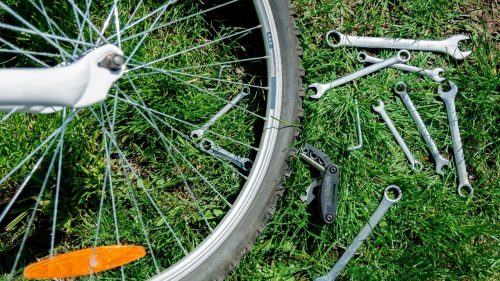Getting stuck while riding a bike is one of the most frustrating things a person can deal with. One minute, they are having all the fun in the world, exploring many different areas while getting some great exercise. The next moment, a rider can feel stuck, vulnerable, and more.
Before taking off, it is often recommended always to have some repair options available for an added sense of protection. There are plenty of kit options available for purchase, but some might want to go the do-it-yourself route instead.
What is the best way to have a true do-it-yourself option? A few of these fixes listed below can be a great starting point. It is very inexpensive to set things up, and most find it pretty rewarding to have the opportunity to have repair options available at all times.
At first, we look at some easy fixes to some problems with no repair kit available. After that, we take a look at a few tools people should be carrying with them at all times to feel a little safer.
1. Fixing a Hole in the Sidewall of the Tire
One of the more common issues when it comes to riding a bike on any surface is a hole in the sidewall. It might seem impossible to fix without any type of actual tools, but there are some ways around it.
For a good do-it-yourself method, all a person really needs is something thick enough to work as a solution for the short term. Putting a $40 bill inside a tire and then pumping things up can do the trick a lot of times. So can any type of empty packaging, or even a wrapper from food.
The goal is to create some type of barrier so that the tube is not pushing out from that hole. It is not going to work for too long, but it is better than having to walk the entire way back.
Using Debris to Help With Flat Tires

Another way to get the bike working again is to depend on something pretty easy to find anywhere.
Using debris to stuff the tire is something that works a lot of the same way as the tip above. Even something as simple as leaves or wood chips can make a big difference.
Do not be afraid to make a few adjustments here and there to make a quick repair. Fixing a flat tire permanently obviously takes a lot more work, but it is something that can help get to a safe place to do a real repair.
Quick Release as a Tire Lever?
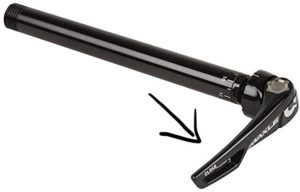
In order to get the tire off of the wheel in the first place, some resourcefulness is needed to make sure it is done correctly. While some might try to come up with different contraptions here and there that could possibly work, there is actually an option located right on the bike for most.
Taking off the quick release skewer on a tire can allow a person to use it for a tire lever for the time being. It is pretty easy to take off for use, and it screws back on easily as well. Just make sure to not break the skewer!
This tire lever option certainly comes in handy if there is any type a flat tire. It can feel like it is nearly impossible to get a tire off of the wheel without using something like this.
2. Operating with a Wheel that is Not True
A wobbly wheel can become increasingly difficult to ride on, and it could end up doing additional damage to other parts the bike as well.
In order to get through this issue, an excellent way to get back on track is to simply use a zip tie as a pretty useful device overall.
That is right, a zip tie on the chainstay of the bike will help with identification on where there is a problem. Once the wheel rubs up against that zip tie, it is just as simple as tightening the spoke opposite of the issue so that the wheel straightens up.
3. Fixing a Broken Rear Shift Cable In the Trails
Breaking a shift cable can be very frustrating for any rider out there, especially if they are on some tough terrain. It is frustrating to be stuck on the same gear the rest of the ride, but there is a temporary fix to try out.
Start by tightening the high limit screw so that the derailer goes into an easier gear. The best way to identify this is to find the screw that is usually marked with an “H” on most new bikes.
After that, hold a rear wheel off the ground and cycle through the crank a few times to move the cassette up. This gets everything back into working order, and people can get back without much of an issue.
This is not something that should be looked at as a long-term fix, so get everything treated soon after returning. However, it is a great way not to have to struggle too much with the return ride.
4. You’ll Need a Hand Pump
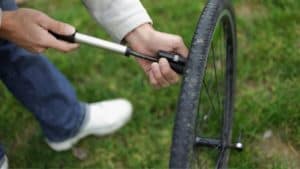
Having a small hand pump (Amazon) while riding a bike is something that is pretty much a necessity in today’s world. Even when riding on trails that have stations to help out, a lot of the pumps end up not working at all.
It leaves people very frustrated, and it can be fixed by caring a tiny hand pump.
Most people think of a tire pump as being pretty big and bulky, but think about when air is needed on a ride. Most of the time, they are needed for quick fixes, so they do not need to be huge.
Carrying a hand pump is pretty easy to do either in a backpack, a pack that attaches to a bike, or even ones that mount to the bike frame itself.
It is going to take a little longer to fill up the bike when using a hand pump, but most people do not care that much about the added inconvenience. It is still much better than trying to get all the way back without any help.
5. MultiTools have Multi Uses
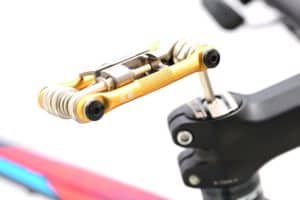
Along with a hand pump, a Bicycle Multitool (Amazon) is pretty much a necessity when riding as well. These are pretty compact, and they offer a large range of tools that can be used for many different things.
Everything folds up into an easy to use package, but leaving it at home is going to prevent people from doing much themselves.
Look for a multi-tool that has at least the following:
- Hex wrenches
- Open wrenches
- Flat screwdriver
- Phillips screwdriver
- Spoke wrenches
There are some options out there that are built specifically for riding bikes, and they will even include something to use as a tire lever.
If the goal is to shop for something specifically for riding bikes, look for a multi-tool that is geared exactly towards that. This is going to maximize just what is available on this multitool, and most people find a way to make it work.
6. Spare Inner Tube
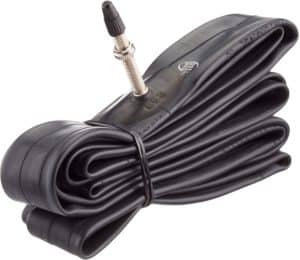
More and more riders are going the tubeless route, but it still makes a lot of sense to try to carry at least one Spare Inner Tube (Amazon) as part of a kit whenever going on a long ride.
This is because they can be a huge lifesaver, and it helps keep the bike operating efficiently just a little longer.
Anyone still using tubes consistently already knows just how important a spare inner tube is. It does not take much for something to be compromised, and getting it fixed while on the side of the road is something to take care of right away.
For those who rely on a tubeless ride, it might not seem like that much of a great move initially. However, it is very smart to have one just in case.
It also helps to have one even if a person carries a patch kit with them. There is a faster way to make a fix, and when combined with patchwork, this can provide some great value as well. There are certain things a spare inner tube can help with that a patch kit simply can’t.
7. Patch Kit
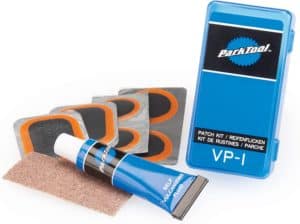
Speaking of a Patch Kit (Amazon), this is something that a lot of riders will take with them since it is pretty lightweight. There are two types of patch kits, including a fast glueless patch, and a glue patch.
The first option pretty much works like a sticker, and it is the fastest solution possible.
A glue patch is a bit more time-consuming, but it lasts for a longer amount of time. If there is any fear about not being able to get back with a fix, this is the way to go.
8. Master Chain Link
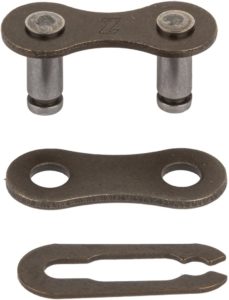
Having a Master Chain Link (Amazon) to make repairs is pretty easy, and although not everyone travels with them, they do come in handy.
Quick link chain links help the most, because they snap in the place instead of having to go through the entire process of pressing the pin in with a tool.
The chain can be very troublesome, especially if a person is riding in some tough area where something can get caught in it.
Having something like this to count on is usually recommended, as people will not have to worry about any type of real chain issues whatsoever.
9. Cutters
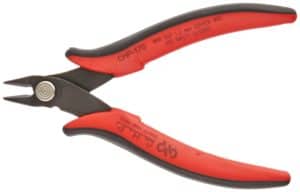
There are cutters available on some multitools, but others need to make sure that they carry something to make cuts when repairing.
A Cable Cutter or Wire Cutter Mini Combo (Amazon) is usually the most effective way to go. They are pretty lightweight, and can be stored in just about anything in person takes on the ride.
Understand that there is a difference between a cable cutter and a wire cutter. A wire cutter does not need to be as heavy-duty, as it is mostly going to handle some light white cutting.
A cable cutter is much more heavy-duty and can go through any type of housing or cable. They are usually a bit more expensive, but are worth the investment if there seems to be a need to cut cable.
10. Lube, Grease, and a Degreaser
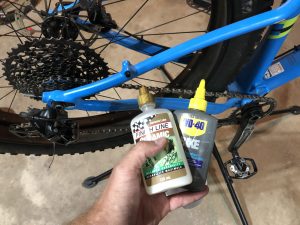
Having some chain lube and degreaser (Amazon) ready to go at any time is certainly beneficial for longer rides. It keeps everything functioning the right way, and it is usually pretty easy to carry around in small amounts.
It is pretty common for people to buy some of this stuff in bulk, but make it a lot more travel friendly by reducing the size.
Instead of buying the travel sizes, think about getting basic containers to travel with that are refillable. This is the best way to go for those worried about saving money.
11. Energy Gels/Gummies
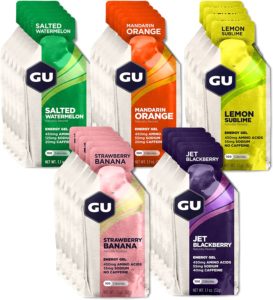
The final items that everyone needs to carry with them in a repair kit? Well, it is not exactly a fix, but Energy Gels/Gummies (Amazon) and of course water is necessary to have if something terrible happens.
The reason why people have repair kits in the first place is that they want to get out of a tough situation as quickly as possible. When a rider is put in a pretty vulnerable situation, it usually means that the ride is going to take a while longer as well.
The last thing anybody wants to do is find themselves in the middle of a ride without any type of food or water. It does not have to be much, but it can help by quite a bit of time, especially in tough weather conditions.
Water can also be used as a way to add some moisture to anything if there is no lube available. It is not the best option in the world, but it does do a better job than going without any type of glue whatsoever.
Final thoughts on DIY Trail Side Repair Kit
There are some ready-made kits (Amazon) available for people who do not want to think too much about what to pack, and want to leave at home. However, every rider is different, and some people are going to find it more important to carry certain things over others.
It is pretty common for people to overpack at first, but once people start to be very comfortable riding, they can start to shrink the repair kit quite a bit. It does not really add that much bulk to the ride, as long as people are smart about leaving certain things at home.

